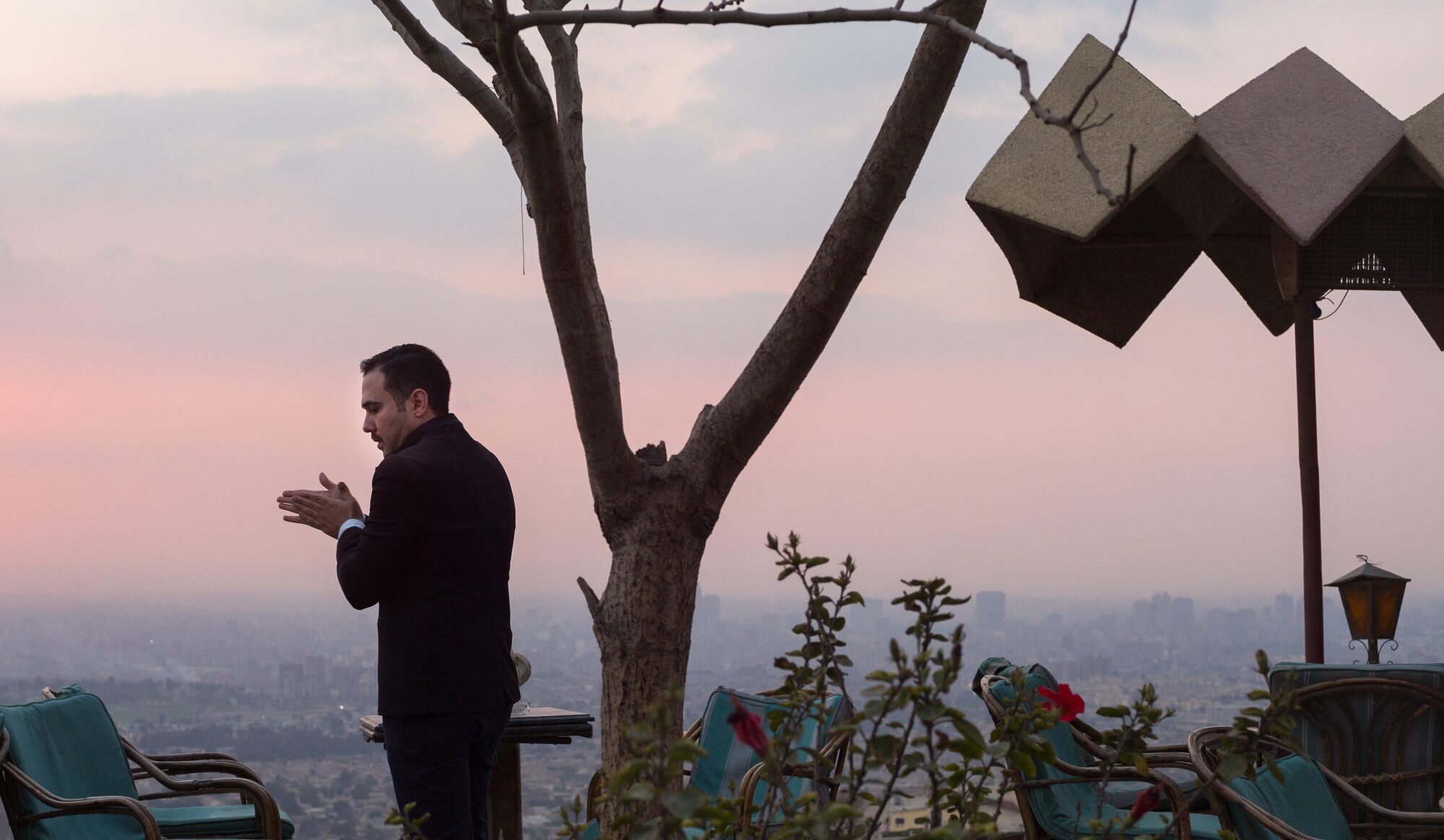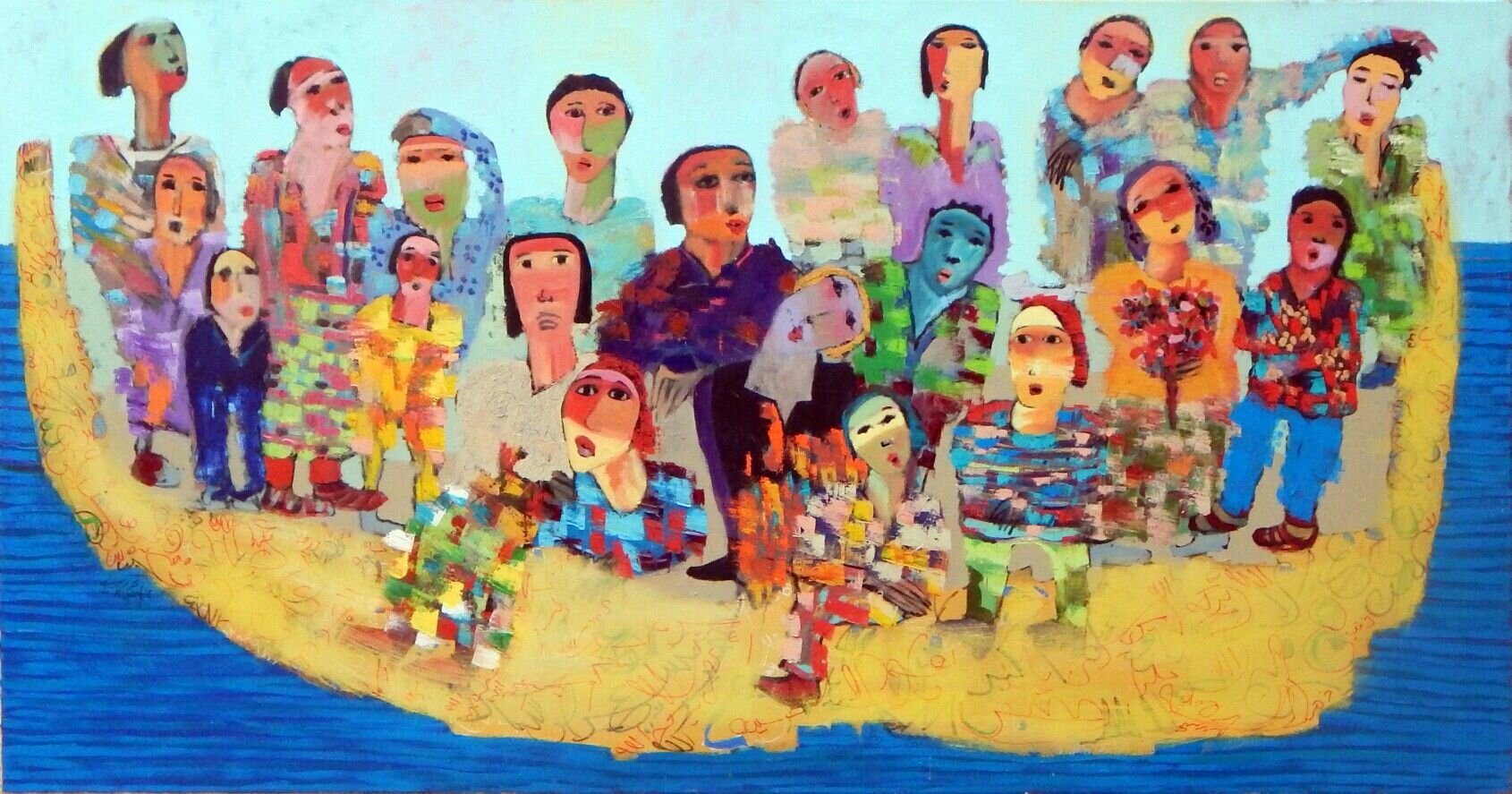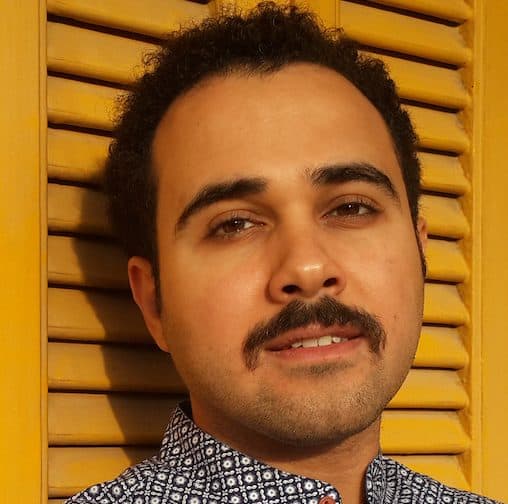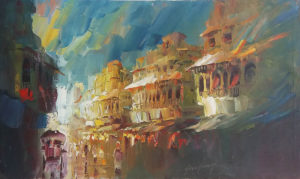After surviving an Egyptian prison and obtaining asylum in the United States, a writer wonders what else he has to do to get ahead.
Ahmed Naji
Translated from the Arabic by Rana Asfour
We encounter no scenes of people lining up in Renaissance paintings, neither is there evidence of the existence of lines among the Romans or the Greek. In the workers’ city by the pyramids, detailed records have been found regarding workers’ wages, their diet, food and beer rations, yet lo and behold, not a single record of any queue appears in any of them.
In an article by Jamie Lauren Keils on the sociocultural history of the line, she wrote that the first mention of lines appeared in Thomas Carlyle’s book on the history of the French Revolution in which he first documented the uncanny scene of people lined up in rows in front of Paris bakeries to buy bread.
Lines are born out of the womb of revolution and rebellion.
The line is in fact a manifestation that confirms the equality between human beings. So it follows that the revolution that caused feudal heads to roll, abolished nobility titles and called for equality and brotherhood, found in the line an exemplary embodiment of its principles as well as a behavioral practice that best reflected the values and laws of the new era.
Prior to the revolution, not only was the consideration of the line near impossible but it was inconceivable as a concept and regarded by many as one that went against the natural order of things. How could one expect a count, for example, to stand in the same line as a commoner? Or for a slave to precede the noble Sheikh Alazhary in a another one?
Ancient societies, monarchical and feudal states typically imposed a pyramid-like organizational structure of hierarchy that ranked individuals according to social, ethnic and religious status, thereby nullifying all chances of equality between those at the top of the structure and those at the bottom of it, or even for the two to ever align in one row.
It was not until the early 19th century, with the advent of the Industrial Revolution and the construction of the modern state, that lines became more profligate, albeit confined to the ranks of the workers. The gentry, however, continued to enjoy privileged back door access.
By the start of the early 20th century, lines were no longer considered a peculiar sight, but rather a highly regarded aspiration and encouraged observance. Complete egalitarianism, all equal in one line, with privileged treatment awarded to none.
In the 21st century, lines have come to symbolize professionalism, order, and efficiency, even when they fall short of these attributes.

All my life I’ve hated lines. My first painful memory of them languishes deep in the soles of my feet, from when at three years old, my mother would occasionally drag me along on her errands to complete some government form or other where, for hours, we stood shuffling between lines, perishing under the heat of the sun. And later, at school, I recall the torment of the daily morning line and an academic life defined by myriad schemes to escape it.
In high school, I found out that I had flat feet and that standing for long hours was indeed medically unadvisable. But it was to be my lifetime’s quest to steer clear from all lines that would ensnare me into the clutches of a path that championed wasta and favoritism.
However, despite my best efforts to escape the line, I could not. Continually, I failed to secure the wasta that would save me and protect me. I reasoned that lines were an unavoidable eventuality anyway, an excremental by-product of modernity, in socialist and capitalist systems alike, with no remedy or cure, like spring allergies or hemorrhoids — a riposte to population growth and dwindling resources.
When, a few years ago, we moved to America, I found that the line had taken on a whole new dimension, patented into a unique American endeavor in which individuals were obligated to line up in one column in order to obtain a ticket that would allow them to transit to another one. Take any government institution or analysis lab, for example, in which no sooner did visitors come to the end of the long line that had greeted them on arrival, than an employee handed them a numbered ticket that bumped them yet again to await a turn in another line, albeit a virtual one this time.
Americans’ love for lines is both mind-boggling and exceptional. They think nothing of dressing up for a night on the town in which they might spend close to an hour, sometimes more, stuck in a line. Never does their happiness diminish or their enthusiasm waiver, as beer in hand, they wait.
Following Egypt’s revolution in January 2011, a good number of publications and promotional flyers doing the rounds honed in on the point that since Egypt had been freed and therefore now belonged to all of us, to care for it meant we had to abide the law. This meant no littering, no vandalism of street lights, and no cutting in line. As such, when the fanfare of electoral activities commenced, photos that captured the long lines of voters were widely circulated to flout the ongoing transformation of the country. In the photos, voters lined up in orderly fashion, patiently waiting for hours on end, albeit not to secure a loaf of bread as in the French revolution, but in order to cast their votes at the ballot boxes.
The historically acknowledged law of the line stipulates their emergence alongside revolutions and their consolidation and expansion under democratic practices. For Egypt, the period of its “democratic processes” was short-lived, having lasted a mere two years, so that by 2013 the country had reverted back to the practices of its formerly corrupt dictatorial and military regime, whereby twenty pounds, or a lesser significant bribe, allowed one to cut in any line. However, wasta guaranteed its beneficiary a bypass of the line altogether and direct access to gateways reserved exclusively for the privileged gentry.
Wasta is the hand that reaches down from the top of the hierarichal pyramid to pluck you out of the line, and it is one that holds the key to the doors of privilege. However, what this helping hand does not guarantee is ascension within the echelons of power, its role restricted to briefly unlocking invisible doors, before it pushes you out to rejoin the “egalitarian line” once more, where you rejoin the masses who stand in rows equally united in their need, in their wait and in their groveling pleas for wasta’s reemergence. Thus rule the elite through the creation of lines, enforcement of laws that regulate them, and monopolizing the power to tip the scales in favor of a select few.

Nevertheless, wasta isn’t in all instances entirely criminal. Many cases show that privilege can be sold in such a way that makes it both legal and legitimate. For example, on renewing one’s passport, there appear to be three price ranges to choose from; the first guarantees the passport is ready in ten days, the second, slightly pricier option, gives it back in three days, whereby the third and most expensive option delivers the passport to its owner on the same day — known in America as the VIP line.
Nowadays, the problem with favoritism (wasta) is no longer that it stands in direct opposition to egalitarianism, or fraternity amongst citizens lined up in the bread line following the French Revolution, but that it allows the leakage of funds outside the system’s control. In closely monitored administrative systems, remedying this leakage takes precedence over the enforcement of any law. As such, legitimizing the cause of the leakage, in the guise of VIP lines, guarantees the refunneling of bribery monies back into the pockets of the system’s gatekeepers.
Wasta is not only important for those in the lower echelons of society as an aid to overcoming the difficulties of life and the ruling order, but it is also vitally important for those at the top of the pyramid as a source of income that consolidates their influence and domination. In countries like Egypt, rife with corruption and hierarchical forms of administration and governance, wasta, or mediation as such, has become the modus operandi.
It would be nearly impossible for a person to get anything done in Egypt without wasta. Rather, the first step, before embarking on any task, is to search for a mediator, be that in order to apply for a school place or to obtain a driver’s licence or to secure employment, irrespective of whether the position were a prestigious or trivial one.
In Egypt, wasta is not only a social construct, it goes so far as to be its fabric, as well as a political order so well-established that the practice itself is no longer frowned upon or considered corrupt. In fact, the same ministers of justice and the judges entrusted with implementing the law are its most brazen offenders, unabashedly offering up positions within the Judiciary exclusively to members of their own family. It goes without saying that the same applies everywhere else in the work force.
One adapts to living with wasta as one does to living with seasonal changes, even when one is averse to dealing with the nuisance of spring allergies. In Egypt, there is no escape from wasta, even for those of us content to live in obscurity, resigned with our place nestled in the lower rungs of society. And yet in spite of all that, there appears to be a kind of social justice in the distribution of wasta, as it becomes apparent that no matter how marginal or insignificant one’s task, there will come a point, when every person is compelled to seek wasta out if plans are to move forward.
After my release from prison in 2016, the prospects of living and working in Egypt narrowed considerably, until it became clear that leaving the country was indeed my only option. And yet, when I arrived at the airport, to my surprise, I was denied exit. For more than two years, I explored every legal channel, stood in every government line at every government agency in a bid to uncover the legal cause behind the imposed travel ban so that I could summarily launch a counter appeal, but to no avail. Having exhausted all options, I turned to groveling and with that unknowingly inaugurated what would turn out to be the most demeaning period of my entire life.
For close to a year and half I literally left no stone unturned, imploring anyone who could, even if remotely, to help me in my quest to find a solution that would lift the travel ban. While some ignored my appeal altogether, others offered promises, and some, returned empty-handed, to reiterate that my case was so “complicated” that there was nothing they could do for me. My desperation had me travelling to different directorates and remote rural villages for an audience with individuals who promised even the tiniest sliver of a connection or affiliation with officers who served in Egypt’s security apparatus, the Mukhabarat. These contacts ran a highly professional operation: At the initial meeting, you’d fill them in regarding the details of your case, after which you agreed to meet again a week later. At this second meeting, your contact would explain that in fact his relative worked for the second or third man in the security apparatus and he would lay out the required stipend: ten thousand dollars in exchange for handing you over to an individual or an entity that would smuggle you across the borders to Sudan, from where you would be free to travel. If, on the other hand, like myself, you lacked the necessary funds, then the deal would automatically be snatched off the table and the once extended helpful hand of wasta withdrew back to whence it came from.
And yet, even then not all was lost. A simple gift, say of a mobile phone, offered to the officer, may be enough to convince him to arrange a meeting with another officer in the security apparatus to whom you may relay your reasons for travel. However, there are no guarantees at this point although the process will set you back a thousand dollars. On the other hand, this will secure a twenty-minute audience with the public security officer at the National Security headquarters. From there, it all boils down to lying, cajoling and using up every trick in the book to convince the officer of your status as an upstanding citizen ardently supportive and loyal to the ruling regime that need neither fear you nor feel threatened by you. It is imperative that you appeal to the officer’s humanity so that after you’ve relayed the details of your “complicated” situation, shared your fears for your poor pregnant wife all alone and lonely in freezing Syracuse, in New York, and after you’ve finally revealed every single card in your deck, he is sufficiently moved that he agrees to flex his clout.
Every time you line up to beseech for wasta, a disparaging feeling takes root within you, burrowing deep no matter your efforts to feign dignity and magnanimity. Every entreaty feels akin to stepping into a passage with an incredulously low ceiling in which you are forced to bend low and then to remain so until you make it all the way to the other side. Shameful and shaming is what wasta truly is.
In America, what makes wasta less widespread despite the prevalence of lines is that the country’s leap from feudalism to postmodernism did not come about through revolutions or a redistribution of wealth. However, it follows that although we may all equally share the experience of standing in line, the fact remains that white people, black citizens, and the new immigrant fresh off the boat, are certainly not treated equally either at the service desk, nor leaned up against a police officer’s firearm. Additionally, those with a desire to entirely bypass the line with $1,000 to spare are guaranteed direct access through VIP gates.
Racial privilege supersedes any other privileges in America. Additionally, the exorbitant cost of privilege means it remains exclusive to the very wealthy, the likes of former President Donald Trump who paid a measly $800 in taxes or if you’re married to the President’s daughter, which secures you a pardon that protects you from prosecution for past transgressions.
Previously, when I lived within a regime centered around wasta, it was still one in which all citizens were guaranteed equal opportunity to access wasta, privilege and clout, albeit to varying degrees that corresponded to each individual’s means. However, in America, a lack of social justice means that I, and all the poor and impoverished like me, are continuously excluded from any claim to privilege as it remains under the strict monopoly of the wealthy. As such, we demand that justice be served.
















